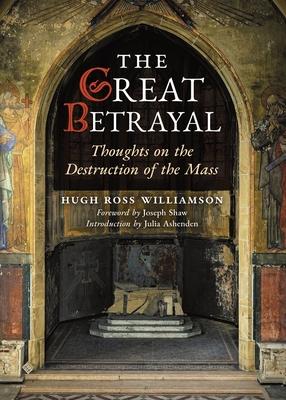British writer Hugh Ross Williamson (1901-1978), an Anglo-Catholic priest who converted to Catholicism in 1955 and a prolific writer of drama and history, wrote two pamphlets, in 1969 and 1970, expressing his conviction that the Novus Ordo Missae represented not a reform of the Roman Rite of Mass but a devastating corruption of it. His background equipped him well to discern the signs of Protestantism and of Modernism as they appeared in the replacement liturgical books, and his conscience bid him speak up against what he called 'the great betrayal' (an ironic echo of his 1955 book on the Roman Canon, The Great Prayer). While many traditionalists would not concur with certain of his conclusions, his intelligent work, motivated by an obvious love for the Faith, helps us to remember today the anguish of spirit through which our forebears had to pass as they saw the heritage for which they converted being dismantled rite by rite.

British writer Hugh Ross Williamson (1901-1978), an Anglo-Catholic priest who converted to Catholicism in 1955 and a prolific writer of drama and history, wrote two pamphlets, in 1969 and 1970, expressing his conviction that the Novus Ordo Missae represented not a reform of the Roman Rite of Mass but a devastating corruption of it. His background equipped him well to discern the signs of Protestantism and of Modernism as they appeared in the replacement liturgical books, and his conscience bid him speak up against what he called 'the great betrayal' (an ironic echo of his 1955 book on the Roman Canon, The Great Prayer). While many traditionalists would not concur with certain of his conclusions, his intelligent work, motivated by an obvious love for the Faith, helps us to remember today the anguish of spirit through which our forebears had to pass as they saw the heritage for which they converted being dismantled rite by rite.